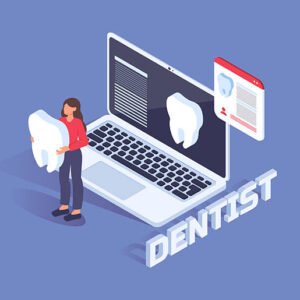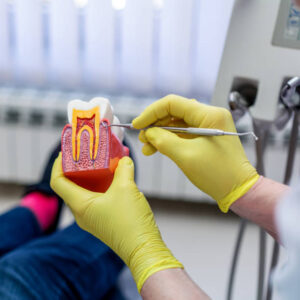Dentistry can be stressful due to the complex operating field, small workplace and the required expert skills.
Patient stress and fear surrounding the dentist is also a factor in creating a sometimes-challenging environment.

Dr. Al Sammarraie
You may hear “I hate going to the dentist” from patients or experience resistance, which can create pressure in your workspace.
Imagine starting your day with high spirits, excited to meet all the patients for the day. Then, as soon as you happily greet them and ask how their day is going, you’re met with, “It could be better if I weren’t here.”
How you respond to these interactions is essential because you can change the atmosphere by encouraging the patient to let their guard down and become more engaged for the remainder of their visit.
The stress a dentist may accumulate throughout the day can also impact their team members. Staff behavior and interpersonal issues can also create excess stress on a dentist, as they are responsible for resolving many issues within the work environment. The pressure of working with anxious and fearful patients can be detrimental to a dental practitioner. While a dentist may not react psychologically to this pressure, the reaction happens physiologically (increased heart rate, high blood pressure, sweating, etc.). In the long run, these instances can damage the body, causing stress on the heart and even an increased risk of a heart attack.
We can’t change the reality regarding patients’ fears and behavioral patterns. It’s natural. But we can learn to accept the pressure, handle it with proper care and maintain healthy responses, creating a much safer and more welcoming environment for the patient and staff.
Emotional intelligence — EQ — is the ability to interpret and manage your emotions, as well as the emotions of others. It’s about using your internal guidance system to make healthy and beneficial choices based on your emotional understanding. When someone has a high level of EQ, they’re able to connect with others on a deeper level, which creates repeat business and increases the likelihood that patients will recommend their services.
Growing up, my country experienced war, and I witnessed first-hand how the absence of emotional intelligence can directly affect society. I saw how the 2003 war directly affected the people. Life seemed to become shorter than before, and it became difficult for me to watch. Moving from such an environment and settling in a place with different surroundings has shown me various levels of emotional intelligence and just how important it is.
While it’s true that dentists are skilled at carrying out dental procedures, research shows that having emotional intelligence as a dentist has a direct effect on the patient’s experience, and even how long they stay with their dentist. Dentists have to be able to deal with the emotional well-being of their patients, too. The more we perceive that we’re being treated with fairness and kindness, the better our overall experience will be.
Stronger relationships
EQ is responsible for lasting healthy relationships because it increases dentists’ awareness of the emotional changes within a clinic. A well-built EQ enhances the sensitivity of a person to their own emotions and those around them. An active awareness of the emotional changes within a dentist’s environment allows the quick initiative to resolve even slight shifts in the working relationship dynamics.
Better communication
Listening is essential for effective communication because it allows us to understand our listener’s feelings and needs before responding. When a dentist fully understands a patient’s needs and why those needs must be met, they can communicate much more effectively. EQ helps them listen, understand the subtle key points of a conversation and allows them to respond appropriately and effectively.
Reading between the lines also helps dentists express empathy by understanding other people’s emotions and the root of these emotions. The truth behind certain emotions can stem from almost every area of their life. This kind of emotional intelligence makes it easier for us to understand our feelings and those of others. Knowing how others feel gives us more confidence and understanding when speaking to them.
Less anxiety and stress
How a dentist responds under pressure is an attribute that defines their success and the success of the dental department as a whole. An emotional reaction during challenging situations masks someone’s objectivity and ability to make rational decisions.
Dental professionals benefit from having high emotional intelligence because their actions and behaviors are absorbed by both patients and staff. Toxic emotions at the dental clinic can affect how dentists live their personal lives and their behavior while at the clinic. As a dentist, such emotions will constrain your ability to inspire and motivate your staff. Successful leaders create healthy work environments by cultivating high emotional intelligence levels, which overcome common feelings of stress and anxiety in the workplace.
Empathy
Empathy allows us all to be more compassionate toward one another, which can only improve our understanding of other people’s behavior and needs. Empathy comes in handy for EQ. Knowing what someone else is feeling or thinking allows you to understand their situation better and act accordingly. Emotional intelligence also helps you understand how your actions affect others emotionally in the dental clinic.
Help Overcome Life Challenges
As a dentist, emotional intelligence helps you overcome challenges. The following are some of the ways that EQ can help you:
- Resilience: You’re more likely to bounce back from adversity if you have emotional intelligence because you control your emotions. If something happens, for example, and your patient gives negative feedback about a procedure — which isn’t good news—you’ll be able to handle it better than someone who doesn’t have strong EQ skills.
- Happiness: High emotional intelligence means recognizing things aren’t going well in your life and changing them before they worsen. By doing this, dentists become less depressed about issues associated with the working environment. It also allows greater flexibility around the dental clinic’s objectives by ensuring dentists don’t hold back on their duties because of undue work pressure.
Conclusion
After years of research and practicing emotional intelligence, I have become a better listener and problem solver, and I always depict calmness in situations when dealing with difficult people. It is not easy to deal with challenges and frustration in the workplace. Everyone needs emotional support from the people they interact with daily. Emotionally intelligent dentists have peace of mind and always excel in their careers.
EQ makes dentists enjoy practicing, reducing work-related stress and burnout, likely increasing their life expectancy. Dentists can then treat patients with honesty, autonomy and humanity, which is in itself giving back to the community. A community that receives positive energy transmits it back. This is the priceless reward of emotional intelligence.
Muhalab Al Sammarraie, D.D.S., grew up in Baghdad before coming to the U.S. as a foreign-trained dentist. He graduated with honors in 2019 and became a member of the ADA, California Dental Association and the San Diego County Dental Society. While working towards his second degree, he accrued leadership experience in public, private, and nonprofit sectors through leading teams and overseeing process improvement in education, social service and health care. Dr. Al Sammarraie is currently a site dental director at AltaMed Health Services, one of the nation’s largest FQHCs. He is also a subject matter expert for the dental board of California. Outside of dentistry, Dr. Al Sammarraie supports activist groups in Iraq that help war victims and displaced people find education and medical care.
.





